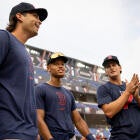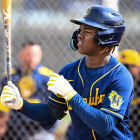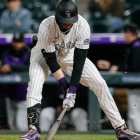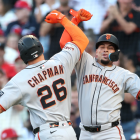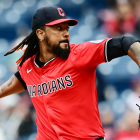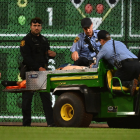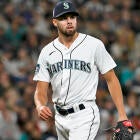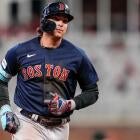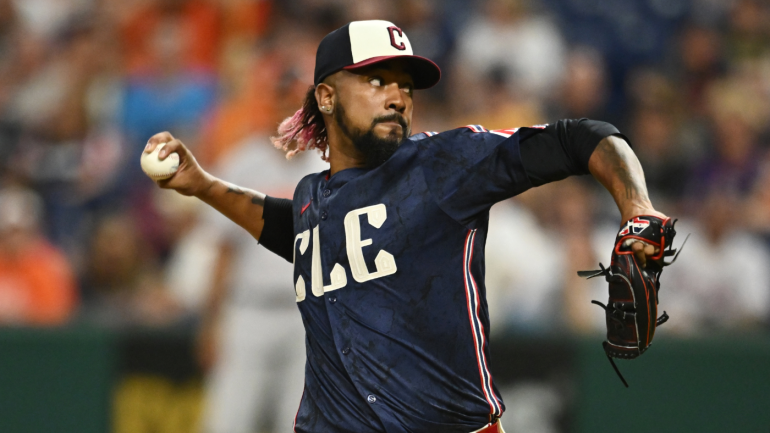
Welcome to Snyder's Soapbox! Here, I pontificate about matters related to Major League Baseball on a weekly basis. Some of the topics will be pressing matters, some might seem insignificant in the grand scheme of things, and most will be somewhere in between. The good thing about this website is that it's free, and you are allowed to click away. If you stay, you'll get smarter, though. That's a money-back guarantee. Let's get to it.
Should relievers have a chance to win the Cy Young?
We know they have before and I'll get into that in a second. If you approach it from the possibly outdated angle that every reliever is a "failed starter" and then take note of the workload, you can argue that a reliever should never even have a chance at winning a Cy Young trophy, which is awarded to the best pitcher in each league, each year.
If we're talking about, for example, 80 innings of work vs. 180 innings and, again, the dude with 80 innings was allegedly deemed not good enough for the job done by the 180-inning guy, logic would dictate that no reliever should ever even be considered for the Cy Young.
And hey, the relievers have their own award. It's named for two of the greatest to ever do it in the Mariano Rivera American League Reliever of the Year and Trevor Hoffman National League Reliever of the Year.
So why am I even talking about this?
Because I think this is more much gray area these days. Some nuance is required in the discussion. Let us start by discussing some dubious award winners.
Overboard in the '80s
The first foray into a reliever winning a major award came in 1974 when Mike Marshall took home the NL Cy Young, but he was far from a one-inning closer. He actually worked more than 200 innings in relief. It was an absurd season in which he won 15 games, saved 21, appeared in 106 and finished 83. We won't see anything like that again any time soon.
Sparky Lyle won the 1977 AL Cy Young as a reliever and then future Hall of Famer Bruce Sutter secured the NL Cy in 1979. This was the beginning of the voting body getting a little too excited about relievers in individual award voting.
- Rollie Fingers won the AL MVP and Cy Young in 1981 with 78 innings pitched. It was a strike-shortened season and he was amazing, finishing with a 1.04 ERA. He had 28 saves in 34 chances. It's just hard for me to believe he was more valuable than Steve McCatty, who had a 2.33 ERA in 185 2/3 innings, but hey, it's not like any starters had upwards of 225 innings or anything. But for MVP? Rickey Henderson and Dwight Evans blew him away in value (each had 6.7 WAR compared to Fingers' 4.2, for example).
- In 1984, Willie Hernandez won the AL MVP and Cy Young. Give him credit for a gigantic workload in relief, as he pitched 140 1/3 innings, posting a 1.92 ERA. Bert Blyleven, though, had a 2.87 ERA in 245 innings, winning 19 games. Dave Stieb had a 2.83 ERA in 267 innings. Mike Boddiker won 20 games and led the league in ERA at 2.79 in 261 1/3 innings. It's awfully tough for me to go with the reliever there. As far as MVP, go check out the seasons had by Eddie Murray, Don Mattingly and Cal Ripken had.
- Steve Bedrosian won the 1987 NL Cy Young. He had 40 saves in 48 chances for an 80-win team. He finished with 89 innings. Nolan Ryan won the ERA title and struck out 270 in 211 2/3 innings, but his teammates sucked and he went 8-16. For shame. Rick Sutcliffe, Orel Hershiser and Bob Welch all could've worked and had better seasons than "Bedrock," but those 40 saves were still kind of a shiny, new toy for voters.
- Mark Davis took the 1989 NL Cy Young. At least his save conversion rate (44 of 48) was great. Still, he finished with 92 2/3 innings compared to Hershiser's 256 2/3. Greg Maddux (19-12, 2.95 ERA, 238 1/3 IP) was also outstanding.
- It was no longer the '80s, but in 1992, Dennis Eckersley took the AL MVP and Cy Young after 80 innings of work. His 1.91 ERA and 0.91 WHIP were amazing, but Roger Clemens (8.8) and Mike Mussina (8.2) blowing away Eckersley's 2.9 WAR is a good illustration of how much more value starters were carrying. As for MVP voting, it's very hard to look at the numbers and tell me a closer was more valuable than Kirby Puckett, Mark McGwire and Frank Thomas, not to mention Clemens and Mussina.
The only reliever to grab hardware since then was Eric Gagne winning the 2003 NL Cy Young. It was a historically great closer season and his chief competition was Jason Schmidt and Mark Prior. I still think the starters provided much more value (again, WAR illustrates as much), but it remains an outlier. Since the Eckersley vote, Gagne is the only reliever to win a Cy Young, which means we've gone more than 30 years with just the one winner.
An overcorrection?
With the game moving toward specialization, the "failed starter" moniker doesn't necessarily apply to every reliever these days. Craig Kimbrel, for example, was drafted as a reliever and never started a game in the minors until a rehab stint in 2016, long after he was established as one of the best closers in the game. To call him a failed starter is totally inaccurate, as he never was a starter.
Aroldis Chapman came up late in 2010 as a reliever and just never went back to the rotation. It wasn't because he failed there.
Some transition quickly, too. Guardians closer Emmanuel Clase was never a starter once he got past rookie ball (he's opened two games). I suppose you could say he failed as a starter in rookie ball, but that seems far less important than how he's developed into a dominant force out of the bullpen.
Knowing all of this, I was wondering if maybe the pendulum in awards voting swung a little too far in the other direction of valuing relievers.
As things stand, Clase has saved 38 games in 41 chances. He has a 0.59 ERA and 0.67 WHIP with 53 strikeouts against only seven unintentional walks in 61 1/3 innings. These are better rate stats than every award-winning reliever mentioned above. It's not even close in some cases.
He ranks fifth in AL pitcher WAR behind Tarik Skubal, Erick Fedde (who is now in the National League, so toss him out), Tyler Anderson and Cole Ragans. Skubal will take things really easy in September, if not get shut down. It's hard to see the entire voting body viewing Anderson as a legitimate Cy Young threat with his 4.46 FIP and 1.23 WHIP on a terrible team. Ragans, who left his start with an injury Monday but is expected to be fine to make his next outing, is an All-Star on a second-place team in a tight race. They're all great. But nobody is running away with this thing.
Obviously, WAR isn't the only stat that matters -- and if it were, Clase would lose -- but I'm just making the point that there's an opening here for Clase to finish second to Skubal or maybe even sneak in and win it if things break his way late.
It's also worth noting here that we're likely to be comparing Clase to pitchers in the 180-200 inning range instead of 225-240 like we were discussing above.
There should be an opening for Clase, even if a small one. I'm still not sure I could bring myself to put an 80-inning reliever in the top spot on the ballot, but I strongly believe he deserves a discussion.
The rash of reliever winners from the late '70s through Eckersley's wins in 1992 resulted in a badly needed correction, but maybe we the voters overcorrected. If it's time for a re-adjustment, Clase's season is a quality starting point.
![[object Object] Logo](https://sportshub.cbsistatic.com/i/2020/04/22/e9ceb731-8b3f-4c60-98fe-090ab66a2997/screen-shot-2020-04-22-at-11-04-56-am.png)









